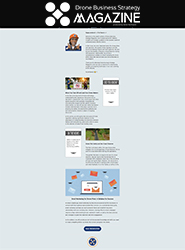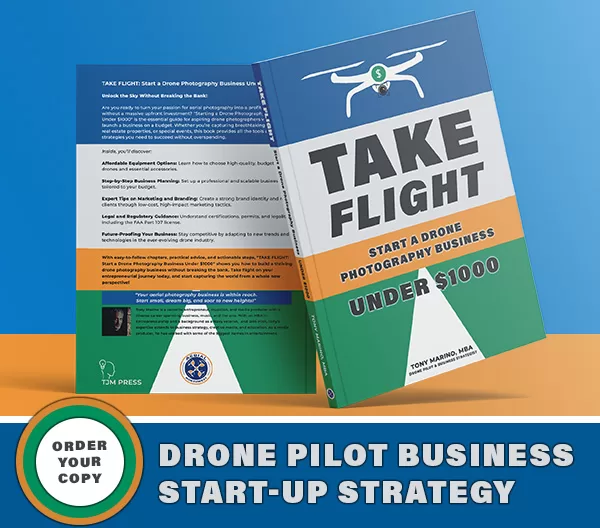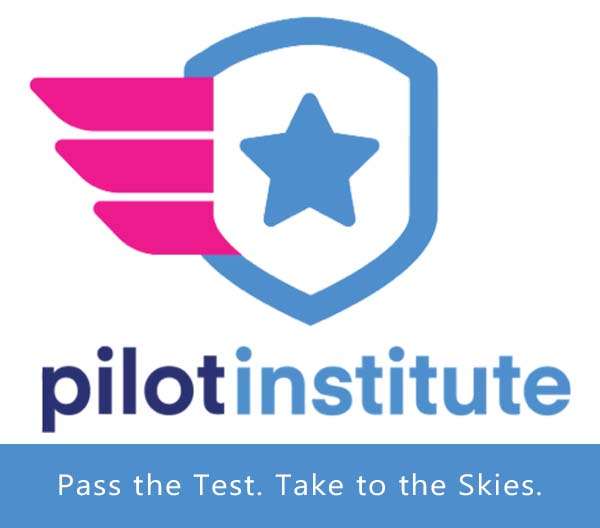
Selling drone services can be a challenging task, especially when faced with rejection from prospective clients. However, a skilled drone pilot knows that a “no” doesn’t always mean the end of the conversation. In fact, it can be an opportunity to turn things around and make the sale. By implementing a range of effective sales strategies, drone pilots can overcome objections, build trust with clients, and ultimately close more sales.
In this article, we’ll explore some of the top strategies drone pilots can use to sell their services to even the most skeptical clients. From demonstrating value to providing education and resources, offering flexible payment options, leveraging social proof, and showing enthusiasm and passion, we’ll cover a range of techniques that can help drone pilots boost their sales and grow their business.
1 | Addressing Objections
Addressing objections involves taking the time to actively listen to the client’s concerns and questions about using drone services. This means understanding what’s behind their objections and providing detailed, informative responses that help alleviate any fears or doubts they may have. For example, if the client is worried about the safety of using drones, the drone pilot could provide information about the pilot’s training and certification, as well as the safety features of the drone itself.
Here are some examples of how a drone pilot could address objections from a client who is concerned about the safety of using drones:
- Provide information about the drone pilot’s training and certification: The drone pilot could explain their qualifications and experience, and share any relevant certifications they have earned. This can help demonstrate the pilot’s expertise and commitment to safety.
- Highlight safety features of the drone: The drone pilot could explain the safety features of the drone being used, such as obstacle avoidance sensors, automatic return-to-home functionality, and fail-safe systems. This can help alleviate concerns about the safety of the equipment being used.
- Share safety regulations and procedures: The drone pilot could explain the safety regulations and procedures they follow to ensure safe drone operations. This can include obtaining necessary permits and authorizations, conducting pre-flight safety checks, and adhering to safety guidelines set by regulatory bodies such as the Federal Aviation Administration (FAA).
- Provide examples of successful projects: The drone pilot could share examples of past projects that were completed safely and successfully, highlighting the safety measures that were taken throughout the process. This can help build confidence in the pilot’s ability to safely and effectively complete projects.
2 | Creating Urgency
Creating a sense of urgency involves helping the client understand why it’s important to act now rather than later. This could mean highlighting upcoming events or deadlines where drone services would be particularly beneficial, or emphasizing the potential cost savings or competitive advantages of using drone services sooner rather than later.
Here are some examples of how a drone pilot could create a sense of urgency for a client considering drone services:
- Highlight upcoming events or deadlines: If the client has an upcoming event or deadline that would benefit from using drone services, the pilot could emphasize the importance of acting quickly to secure the necessary services. For example, if the client is in the real estate industry and has an upcoming open house, the pilot could explain how drone services can help showcase the property and generate interest from potential buyers.
- Emphasize potential cost savings: The drone pilot could explain how using drone services could help the client save money in the long run. For example, if the client is in the construction industry, the pilot could explain how using drones to survey and inspect sites can help identify issues early on, preventing costly rework or delays later in the project.
- Highlight competitive advantages: The drone pilot could explain how using drone services can give the client a competitive advantage over others in their industry. For example, if the client is in the agriculture industry, the pilot could explain how using drones for crop monitoring and analysis can help increase yields and improve efficiency compared to traditional methods.
3 | Offering a Trial or Demo
Offering a trial or demo allows the client to experience the benefits of the drone services firsthand, which can be a powerful way to overcome any hesitation they may have. This can be especially helpful for clients who are new to drone services or unsure about the benefits. The pilot can use the opportunity to showcase their skills and expertise, answer any questions the client may have, and build trust with the client.
Here are some examples of how a drone pilot could offer a trial or demo to a client:
- Free trial: The drone pilot could offer the client a free trial of their services, allowing the client to experience the benefits of drone services without any financial commitment. This can be a great way to build trust with the client and demonstrate the value of the pilot’s services.
- Discounted rate for the first project: The pilot could offer a discounted rate for the client’s first project, allowing them to try out the services at a reduced cost. This can be a good way to incentivize the client to take action and try out the services.
- Demonstration: The pilot could offer a demonstration of their services, showing the client what they can expect from the services and how they can benefit their business. This can be a great way to showcase the pilot’s expertise and answer any questions the client may have.
4 | Identifying Decision-Makers:
Identifying decision-makers involves doing research on the client’s organization to determine who has the authority to make purchasing decisions. This could mean speaking with IT departments, project managers, or other executives to understand their needs and priorities, and tailoring the sales pitch accordingly. Understanding who the decision-makers are and what their concerns are can help the drone pilot position their services in a way that speaks directly to the needs and goals of the organization.
Identifying decision-makers can be a critical step in the sales process. For example, if the drone pilot is trying to sell their services to a large construction company, it would be important to understand who the key decision-makers are within the organization. This might include the project manager, the safety officer, and the executive team.
To identify the decision-makers, the drone pilot could begin by researching the company’s organizational chart, or by reaching out to contacts within the organization who may be able to provide information about who is involved in the decision-making process. Once the decision-makers have been identified, the drone pilot can tailor their sales pitch to speak directly to the needs and concerns of each individual.
For example, the project manager may be primarily concerned with cost and efficiency, while the safety officer may be more concerned with the safety and compliance aspects of using drones on the job site. By understanding these different priorities, the drone pilot can position their services in a way that speaks directly to the needs and goals of each individual decision-maker, increasing the chances of a successful sale.
5 | Offering a Guarantee
Offering a guarantee is a powerful way to alleviate any concerns or fears the client may have about taking on a new drone service provider. By offering a guarantee, the drone pilot can demonstrate their commitment to providing high-quality service that meets the client’s needs.
For example, a drone pilot might offer a satisfaction guarantee, which promises that the client will be completely satisfied with the services provided. If the client is not completely satisfied, the drone pilot will work with them to address any concerns and ensure that the services meet their needs.
Alternatively, the drone pilot might offer a money-back guarantee, which promises that the client will receive a refund if they are not satisfied with the services provided. This can be an effective way to overcome any risk aversion the client may have and build trust with the client.
Ultimately, offering a guarantee shows that the drone pilot is confident in their ability to deliver high-quality services and is willing to stand behind their work. This can be a powerful selling point for clients who are looking for a reliable and trustworthy drone service provider.
6 | Offering a Customized Solution
Offering a customized solution is a key aspect of successful drone service sales. Every client has unique needs and requirements, and it’s important for the drone pilot to understand those needs in order to propose a solution that provides the most value. This might involve conducting a needs assessment, which could include consulting with the client’s IT or data analysis team to better understand the client’s specific requirements.
For example, a construction company may need drone services to survey a large job site for planning and monitoring purposes. The drone pilot would need to understand the specific requirements for the survey, such as the size of the site, the level of detail required, and any safety regulations that need to be adhered to. Based on this information, the pilot could propose a customized solution that includes the appropriate equipment and software to meet the client’s needs.
By offering a customized solution, the drone pilot demonstrates their expertise and commitment to providing a solution that is tailored to the client’s specific needs. This can build trust and confidence with the client, leading to a successful sale and a long-term business relationship.
7 | Building a Relationship
Building a relationship with a client is a long-term strategy that involves consistent effort and investment. It’s about understanding the client’s business, their goals, and their pain points, and demonstrating a genuine interest in helping them succeed. This approach can help to establish trust and credibility, which can be essential for building long-term partnerships.
One way to build a relationship with a client is to attend industry events or trade shows where the client may be present. This can provide an opportunity to meet with the client face-to-face, learn more about their needs, and showcase the drone services that the pilot can offer. By attending these events regularly, the pilot can build a reputation within the industry and establish themselves as a reliable and knowledgeable resource.
Another way to build a relationship with a client is to offer support and expertise beyond just selling drone services. This might involve volunteering time and expertise to help the client achieve their goals, such as providing advice on regulatory compliance, offering training to help the client better understand drone technology, or sharing insights on how drone services can benefit their industry.
Finally, staying in touch with the client and providing ongoing support is crucial for building a strong relationship. This might involve checking in with the client regularly to see how they’re doing, offering assistance if they encounter any issues or challenges, or providing updates on the latest drone technology and trends. By showing that they care about the client’s success, the pilot can build a lasting and mutually beneficial relationship.
8 | Offering a Package Deal
Offering a package deal is a great way to provide value to clients while also standing out from the competition. For example, a drone pilot might offer a package deal that includes not only drone services, but also data analysis and reporting or video post-editing. By bundling these services together, the client can enjoy a more comprehensive solution while also saving time and money.
To create a package deal, the drone pilot will need to conduct a thorough assessment of the client’s needs and goals. This might involve speaking with various stakeholders within the organization, such as project managers or IT professionals, to get a clear understanding of what the client is looking for. Based on this information, the drone pilot can craft a solution that meets the client’s needs while also providing additional benefits.
One key advantage of offering a package deal is that it can help the drone pilot build long-term relationships with clients. By providing a comprehensive solution that addresses all of the client’s needs, the drone pilot can become a trusted partner and advisor, rather than just another vendor. This can lead to repeat business, referrals, and positive reviews, all of which can help the drone pilot grow their business over time.
Overall, offering a package deal requires a deep understanding of the client’s needs and goals, as well as a willingness to be flexible and creative in crafting a solution. By doing so, the drone pilot can provide added value to clients and differentiate themselves from the competition, while also building long-term relationships that can benefit their business in the years to come.
9 | Demonstrating Expertise
Demonstrating expertise is an important aspect of successful drone service sales. One way to demonstrate expertise is to provide evidence of the drone pilot’s qualifications, experience, and track record. For example, a drone pilot might share their certifications, licenses, and insurance policies with potential clients. They might also provide case studies or testimonials from other clients, showcasing successful projects and highlighting positive feedback.
In addition, it’s important for the drone pilot to demonstrate a commitment to safety and compliance. They might provide information on their safety protocols and procedures, as well as any compliance standards they adhere to. This can help build trust with the client, who may be concerned about the risks associated with drone services.
Overall, demonstrating expertise can help a drone pilot stand out from the competition and build credibility with potential clients. By providing concrete evidence of their qualifications and experience, as well as a commitment to safety and compliance, they can increase the chances of closing a sale and building long-term relationships with clients.
10 | Offering a Discount or Promotion:
Offering a discount or promotion is a common marketing strategy used by drone pilots to attract new clients or retain existing ones. A well-designed discount or promotion can be a powerful incentive for clients to try out the pilot’s services or continue working with them. For example, a drone pilot might offer a discount to a client who signs a long-term contract or refers new business to the pilot. Alternatively, the pilot might offer a promotion that includes a free add-on service, such as aerial photography or video, to sweeten the deal and provide additional value to the client.
When offering a discount or promotion, it’s important for the drone pilot to understand the client’s budget constraints and tailor the offer accordingly. For example, a discount that’s too small may not be compelling enough to persuade the client to use the pilot’s services, while a discount that’s too large may cut into the pilot’s profits and undermine their ability to deliver high-quality service. By understanding the client’s budget and crafting a well-designed discount or promotion, the drone pilot can increase their chances of closing a sale and building a long-term relationship with the client.
11 | Leveraging Social Proof
Leveraging social proof is a powerful way to build trust with potential clients and demonstrate the value of the drone pilot’s services. Social proof can come in many forms, such as testimonials from satisfied clients, case studies that highlight successful projects, or reviews and ratings on third-party platforms. By sharing this evidence of past successes and happy clients, the drone pilot can show potential clients that they are experienced, reliable, and deliver high-quality results.
For example, a drone pilot could create a portfolio of their work, complete with detailed case studies and testimonials from satisfied clients. They could also encourage happy clients to leave reviews on third-party review sites like Yelp or Google My Business, which can be powerful social proof for potential clients researching drone service providers. Additionally, the drone pilot could share their portfolio and testimonials on social media platforms like LinkedIn or Twitter, which can help them reach a wider audience and attract new clients.
12 | Providing Education and Resources
Providing education and resources is an important aspect of successful drone service sales as it helps to build trust and establish the drone pilot as an expert in the field. By providing education and resources, the pilot can help the client to understand the benefits and risks associated with drone technology and how to leverage it effectively for their specific needs.
For example, a drone pilot may offer training materials on how to use drone technology to conduct aerial surveys, or they may provide lesson plans on how to use drones for infrastructure inspection. They may also offer resources such as checklists, safety guidelines, and best practices to ensure that the client is well-informed and prepared to use drone technology safely and effectively. By providing this education and resources, the drone pilot can demonstrate their expertise and value to the client, which can lead to increased sales and long-term business relationships.
By providing education and resources to clients, drone pilots can not only help them understand the benefits of using drones but also help them to become more confident and informed about the technology. This can increase the likelihood of repeat business and referrals. For example, a drone pilot could offer a free workshop or webinar on the benefits of using drones for surveying or inspection. They could also provide case studies or examples of how drones have been used in similar situations to demonstrate their effectiveness.
13 | Offering Flexible Payment Options
Providing education and resources is an important aspect of successful drone service sales as it helps to build trust and establish the drone pilot as an expert in the field. By providing education and resources, the pilot can help the client to understand the benefits and risks associated with drone technology and how to leverage it effectively for their specific needs.
For example, a drone pilot may offer training materials on how to use drone technology to conduct aerial surveys, or they may provide lesson plans on how to use drones for infrastructure inspection. They may also offer resources such as checklists, safety guidelines, and best practices to ensure that the client is well-informed and prepared to use drone technology safely and effectively. By providing this education and resources, the drone pilot can demonstrate their expertise and value to the client, which can lead to increased sales and long-term business relationships.
By providing education and resources to clients, drone pilots can not only help them understand the benefits of using drones but also help them to become more confident and informed about the technology. This can increase the likelihood of repeat business and referrals. For example, a drone pilot could offer a free workshop or webinar on the benefits of using drones for surveying or inspection. They could also provide case studies or examples of how drones have been used in similar situations to demonstrate their effectiveness.
14 | Showing Enthusiasm and Passion
Expressing enthusiasm and passion is a compelling strategy for drone pilots to connect with potential clients and demonstrate the advantages of using drones. When a drone pilot is genuinely enthusiastic about their work, it can be contagious and inspire the client to share that excitement. By sharing their own experiences and accomplishments, the drone pilot can prove their knowledge and expertise, and exhibit the client what can be achieved with drone technology.
For example, consider a drone pilot who has a passion for utilizing drones for real estate photography. They can share their portfolio of breathtaking aerial photos and clarify how they have helped previous clients sell their properties faster and for better prices. By demonstrating a clear understanding of the client’s needs and goals, and showing them how drones can help achieve those goals, the pilot can build a relationship and increase the chances of closing a sale.
Moreover, showing enthusiasm and passion can also help to establish trust with the client. When the drone pilot is genuinely invested in the success of the project, the client is more likely to trust their advice and expertise. This can lead to a stronger working relationship and potential future sales opportunities.
For instance, a drone pilot might showcase their passion for aerial photography by presenting stunning shots they have captured on previous projects. They may also discuss their passion for the technology and how it has transformed their work, as well as their excitement for the potential it holds for the client’s specific industry or project.
Additionally, showing enthusiasm and passion can also help the drone pilot to overcome objections or concerns the client may have. By demonstrating a deep understanding of the technology and its capabilities, and sharing their own success stories, the pilot can reassure the client that they are in capable hands and that their project is in good hands.
The Takeaway
Selling drone services to potential clients can be challenging, especially when faced with objections or budget constraints. However, by utilizing the strategies outlined in this article, drone pilots can increase their chances of closing a sale and building a successful business. Whether it’s leveraging social proof, providing education and resources, offering flexible payment options, or showing enthusiasm and passion, these techniques can help drone pilots differentiate themselves from the competition and build strong connections with clients.
By understanding the client’s needs and goals, and tailoring their approach accordingly, drone pilots can overcome objections and close more sales, ultimately growing their business and reputation in the industry.
Be smart, safe, and forever fly!
If you have any questions, let us know! If you’d like to hire us, you can get more information here.
Written by: Tony Marino, MBA – FAA Certified Part 107 Commercial Drone Pilot and Chief Business Strategist at Aerial Northwest
Frequently Asked Questions
References
Farris, P., Bendle, N., Pfeifer, P., & Reibstein, D. (2015). Marketing Metrics: The Manager’s Guide to Measuring Marketing Performance. Pearson.
Harvard Business Review, Christensen, C. M., Levitt, T., & Reichheld, F. (2013). HBR’s 10 Must Reads on Strategic Marketing. Harvard Business Review Press.
Porter, M. E. (1998). Competitive strategy: Techniques for analyzing industries and competitors. Free Press; Illustrated edition.
Disclaimer: The information provided in this blog post is for general informational purposes only and should not be construed as legal advice.

DRONE BUSINESS STRATEGY MAGAZINE
A free digital publication made exclusively for all small business drone pilots to them help start-up, become profitable while sustaining a competitive advantage within the drone service industry sector they opt to serve.
“If you love to fly, we’d love to have you come aboard!”
We share your information with no one. Our Privacy Policy.









Leave a Reply
Your email is always safe with us.